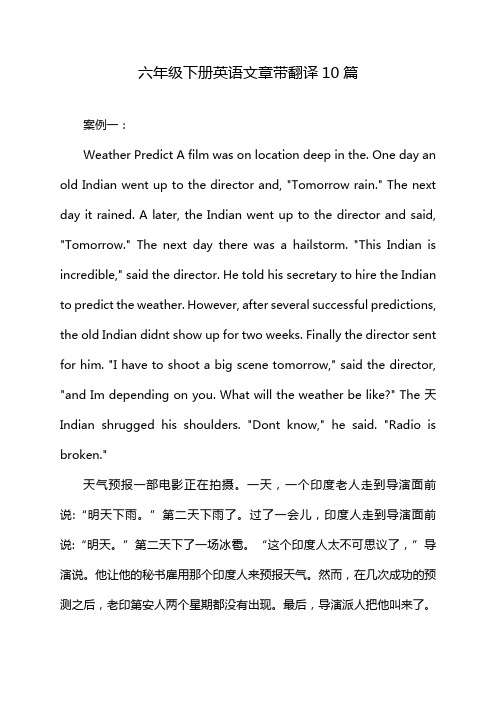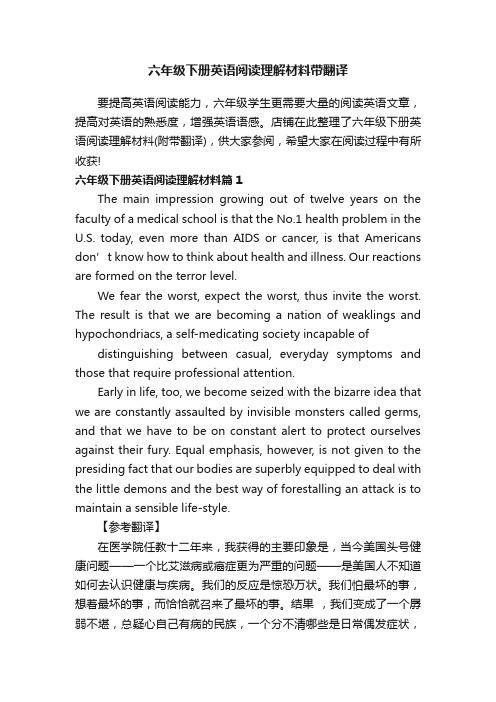六年级英语下册附带翻译的阅读材料.doc
六年级英语下册素材-Unit1 The lion and the mouse课文翻译 译林版(三起)

Unit1 The lion and the mouse第一单元狮子和老虎Story time①There was a lion in the forest. He was very large and strong.森林里有一只狮子。
他非常大并且强壮。
①One day, a mouse walked by and woke the lion up. The lion was angry and wanted to eat the mouse. "Please don't eat me. I can help you some day, "said the mouse quietly. "You're so small and weak! How can you help me? "laughed the lion loudly. Then, he let the mouse go.一天,一只老鼠走过,把狮子吵醒了。
狮子很生气,想要吃了这只老鼠。
“请不要吃我。
有一天我能帮助你。
”老鼠小声地说。
“你这么弱小!你怎么能帮助我?”狮子大声地笑。
然后,他放开了老鼠。
①The next day, two men caught the lion with a large net. The lion bit the net with his sharp teeth, but that did not help. "How can I get out? "asked the lion sadly.第二天,两个男人用一张大网抓住了狮子。
狮子用他锋利的牙齿咬那张网,但那不管用。
“我怎么能出去呢?”狮子难过地问。
①Just then, the mouse saw the lion. "I can help you, " he said. Soon, the mouse madea big hole in the net with his teeth.The lion got out. "Thank you!" said the lion happily.就在那时,老鼠看见了狮子。
六年级下册英语文章带翻译10篇

六年级下册英语文章带翻译10篇案例一:Weather Predict A film was on location deep in the. One day an old Indian went up to the director and, "Tomorrow rain." The next day it rained. A later, the Indian went up to the director and said, "Tomorrow." The next day there was a hailstorm. "This Indian is incredible," said the director. He told his secretary to hire the Indian to predict the weather. However, after several successful predictions, the old Indian didnt show up for two weeks. Finally the director sent for him. "I have to shoot a big scene tomorrow," said the director, "and Im depending on you. What will the weather be like?" The 天Indian shrugged his shoulders. "Dont know," he said. "Radio is broken."天气预报一部电影正在拍摄。
一天,一个印度老人走到导演面前说:“明天下雨。
”第二天下雨了。
小学六年级英语课外阅读带翻译

小学六年级英语课外阅读带翻译小学六年级英语课外阅读(三)【小熊家有个新成员】1. Small Bear loves his little bed. Papa Bear made the bed for him when he was a baby. But one morning, Small Bear wakes up with pains in his legs. He is too big for his little bed now.小熊很喜欢自己的小床。
这张小床是熊爸爸在小熊很小的时候为他做的。
但是有一天早晨,小熊起床时发现腿非常疼。
原来是他已经长大了不能睡下这张小床了。
2. "Today, we shall go out into the woods and make you a bigger bed!" Papa takes up his ax and goes out the door. "But, Papa," calls Small Bear. "What will happen to my little bed?"“今天,我们去林子里取些木头帮你做个大点的床吧!”熊爸爸拿上他的斧头出了门。
“可是,爸爸,”小熊说,“那我的小床该怎么办啊?”3. "Don't worry about that, Small Bear," says Mama Bear. "We will have a new baby soon."“这个不用担心,小熊,”熊妈妈说。
“很快我们就会有个新孩子。
”4. Papa and Small Bear make a bigger bed. They carry it back home.熊爸爸和小熊做了一个大点的床。
他们将它搬回家。
5. Small Bear can't find his old bed. "Where is my little bed?" "Come and see," calls Mama from the next room. It is true! There is his little bed. There is a baby sister in it. Now Small Bear is a big brother!小熊回到家找不到他原来的小床了,便问:“我的小床去哪了?”“过来看看,”熊妈妈在另一个房间叫他。
六年级下册英语阅读理解材料带翻译

六年级下册英语阅读理解材料带翻译要提高英语阅读能力,六年级学生更需要大量的阅读英语文章,提高对英语的熟悉度,增强英语语感。
店铺在此整理了六年级下册英语阅读理解材料(附带翻译),供大家参阅,希望大家在阅读过程中有所收获!六年级下册英语阅读理解材料篇1The main impression growing out of twelve years on the faculty of a medical school is that the No.1 health problem in the U.S. today, even more than AIDS or cancer, is that Americans don’t know how to think about health and illness. Our reactions are formed on the terror level.We fear the worst, expect the worst, thus invite the worst. The result is that we are becoming a nation of weaklings and hypochondriacs, a self-medicating society incapable of distinguishing between casual, everyday symptoms and those that require professional attention.Early in life, too, we become seized with the bizarre idea that we are constantly assaulted by invisible monsters called germs, and that we have to be on constant alert to protect ourselves against their fury. Equal emphasis, however, is not given to the presiding fact that our bodies are superbly equipped to deal with the little demons and the best way of forestalling an attack is to maintain a sensible life-style.【参考翻译】在医学院任教十二年来,我获得的主要印象是,当今美国头号健康问题——一个比艾滋病或癌症更为严重的问题——是美国人不知道如何去认识健康与疾病。
课外阅读英语短文带翻译六年级英语短文带翻译

课外阅读英语短文带翻译六年级英语短文带翻译英语阅读,是英语学习和英语教学中的一个重要环节,它是我们获取知识、外界信息,与外界交流的主要途径之一。
了课外英语短文带翻译,欢迎阅读!On Saturday, the weather is sunny, cloudless sky, a group of birds chattering in the trees, as if to we hear singing hit song. At this moment, I saw a little sparrows on our car.Father rushed the sparrow away, but the little sparrow or motionless parked in the car. Jumped up and down in a moment, my father caught the little sparrows, at this time, I carefully looked at the little sparrow, its feathers have not full long, also not too will fly, only walking up and down on the car. I said to my father: "dad, you don't catch! We should protect animals, not hurt them, this is wrong." Say that finish, I heard the tree sparrow kept calling, as if to say: "put a small sparrow, put it!" So my father gently sparrow on the branches, let the little sparrow in the nature of life freely. The sparrows on the tree one see we put the little sparrow, chattering again, as if to say to me: "you are such a good child to protect animals."If no animal nature, all things, there is no life, if there is no grass plants, herbivorous animals can't live forever. Start from today, to protect the animals, love life, do a little guardians of nature.全世界有794多种野生动物,其中有76科300余种濒临灭绝,还有很多已经灭绝了。
六年级英语课外阅读材料带中文翻译

六年级英语课外阅读材料带中文翻译假如我们有足够的英语词汇量,那么我们周末在看英语课外阅读材料时,就不会遇到太多生字词,看英语文章的时候也不会时常需要查阅英语字典。
这里与大家分享六年级英语课外阅读材料,有时间我们不妨学习一下,看看自己能够做到何种程度。
六年级英语课外阅读材料(一)【海边度假】①Papa, Mama, Brother and Sister go to the shore for weekend. There is a house for them to stay in.爸爸、妈妈、哥哥和妹妹周末去海边度假。
那有一所房子可以住在里面。
②"Let's put on swimming suits and go into the water!" says Brother. "Wait, we must clean up, room by room!" says Mama.我们穿上泳衣下水吧”哥哥说。
“等等,我们必须要先把每个房间收拾下”妈妈说。
③A fter that, Brother and Sister set out for the sea. Mama stops them and says, "Wait, there are things to carry, beds to make and clothes to clean."收拾了屋子之后,哥哥和妹妹出发去了海边,妈妈阻止了他们并说:“等等,有些东西要拿,还要整理床和洗衣服”④After that, Sister says, "It's time for swimming!" But M ama says, "Wait, it's time for us to eat something."这之后,妹妹说:“游泳时间到了”。
快乐英语阅读六年级下册和风主编译林教育副翻译

快乐英语阅读六年级下册和风主编译林教育副翻译阅读短文,完成任务。
(14分)Hi, Linda!How are you? What’s the weather like in Australia? It’s summer here. Because it’s June, the weather is not so hot. June is my favourite month. We often have a lot of funon Children’s Day. My birthday is also in June. My family will have a birthday party for me. And we will have an English test on June 20th. After that, the summer vacation is coming! We can get together.When you come, you can visit the West Lake. It’s near my home. It has beautiful sights. Please come here soon and I am sure you will have a good time!Best wishes,Betty短文翻译:你好,琳达!你好吗?澳大利亚的天气怎么样?现在是夏天。
因为现在是六月,天气不那么热。
六月是我最喜欢的月份。
我们经常在儿童节玩得很开心。
我的孩子也是在六月。
我的家人将为我举办一个生日聚会。
我们将在6月20日进行英语考试。
在那之后,暑假就要来了!我们可以聚在一起。
当你来的时候,你可以去参观西湖。
它在我家附近。
它有美丽的风景。
请快点来这里,我相信你会玩得很开心的!最好的祝福贝蒂。
(完整word)人教版六年级下册英语课文翻译.doc

...[ 标签 :标题 ]篇一:六年级下课文翻译六年级下课文翻译篇二:人教新版英语六下英语课文翻译( 人教版 )六年级下册英语课文翻译第一单元Let ’ s start你多高?你多重?谁比你高?谁比你重?首页祖姆:我 1.60 米高。
我比这只恐龙高。
次波:我21 米高!我比你高得多!萨拉:它的尾巴更长些。
怀特小姐:一些恐龙比房子还要大。
一些比我们书包还要小。
约翰:它真高!A部分Let ’ s learn你比你弟弟高!是的!我身高160 厘米。
他身高159 厘米。
Let ’s play从矮到高站队!我比你高!从你年纪小到年纪大站队!我比你年纪大一些!Let ’s talk你有多高?我164 厘米高。
你比我矮。
是的,我160 厘米高。
你比我高 4 厘米。
我11 岁了。
我 12 岁了,我比你大 1 岁。
我重 51 千克。
我重 50 千克,你比我长得又高又强壮。
Group work 1你多大了?我12岁。
你多高?我164 厘米。
2 吴一凡比约翰高。
埃米比萨拉年纪大些??Let ’ s read你喜欢哪只猴子,本?我喜欢黄色的。
看,他比那只棕色的猴子更高些。
哪只猴子更强壮?棕色的猴子更强壮。
但那只黄色的猴子更高些。
我喜欢那只小猴子,它年幼又有趣。
它尾巴有多长?我想这只小猴子只有40 厘米高,它的尾巴大约有30 厘米长。
我想那只黄色的猴子有150 厘米高。
那只黄色的猴子更高一些,但那只小猴子更有趣一些。
Pair work 这是我。
那是我的朋友。
她比我大两岁,而且她更高一些。
她有长头发和大眼睛??B 部分Let ’ s learn他的尾巴更长。
他的头更小。
Let ’ s play我比你高,而且比你重。
我的手比你的大。
我的胳膊比你的长。
Let ’ s talk 你多重?我重48 千克。
我比你瘦还比你矮,是的我比你高大,比你强壮。
你腿有多长?76 厘米你脚多大?我穿17 码的鞋。
我穿16 码的鞋。
Pair work 1你多高?你的腿多长?让我看看??2我比较高。
- 1、下载文档前请自行甄别文档内容的完整性,平台不提供额外的编辑、内容补充、找答案等附加服务。
- 2、"仅部分预览"的文档,不可在线预览部分如存在完整性等问题,可反馈申请退款(可完整预览的文档不适用该条件!)。
- 3、如文档侵犯您的权益,请联系客服反馈,我们会尽快为您处理(人工客服工作时间:9:00-18:30)。
六年级英语下册附带翻译的阅读材料六年级英语下册阅读材料篇1Reading is a pleasure of the mind, which means that it is a little like a sport: your eagerness and knowledge and quickness make you a good reader. Reading is fun, not because the writer is telling you something, but because it makes your mind work. Your own imagination works along with the author s or even goes beyond his. Your experience, compared with his, brings you to the same or different conclusions, and your ideas develop as you understand his.Every book stands by itself, like a one-family house, but books in a library are like houses in a city. Although they are separate, together they all add up to something; they are connected with each other and with other cities. The same ideas, or related ones, turn up in different places; the human problems that repeat themselves in life repeat themselves in literature, but with different solutions according to different writings at different times.Reading can only be fun if you expect it to be. If you concentrate on books somebody tells you ought to read, you probably won t have fun. But if you put down a book you don t like and try another till you find one that means something to you, and then relax with it, you will almost certainly have a good time--and if you become as a result of reading, better, wiser, kinder, or more gentle, you won t have suffered during the process.【参考翻译】读书是愉悦心智之事。
在这一点上它与运动颇为相似:一个优秀的读者必须要有热情、有知识、有速度。
读书之乐并非在于作者要告诉你什么,而在于它促使你思考。
你跟随作者一起想像,有时你的想象甚至会超越作者的。
把自己的体验与作者的相互比较,你会得出相同或者不同的结论。
在理解作者想法的同时,也形成了自己的观点。
每一本书都自成体系,就像一家一户的住宅,而图书馆里的藏书好比城市里千家万户的居所。
尽管它们都相互独立,但只有相互结合才有意义。
家家户户彼此相连,城市与城市彼此相依。
相同或相似的思想在不同地方涌现。
人类生活中反复的问题也在文学中不断重现,但因时代与作品的差异,答案也各不相同。
如果你希望的话,读书也能充满乐趣。
倘若你只读那些别人告诉你该读之书,那么你不太可能有乐趣可言。
但如果你放下你不喜欢的书,试着阅读另外一本,直到你找到自己中意的,然后轻轻松松的读下去,差不多一定会乐在其中。
而且,当你通过阅读变得更加优秀,更加善良,更加文雅时,阅读便不再是一种折磨。
六年级英语下册阅读材料篇2Baekeland and Hartmann report that the short sleepers had been more or less average in their sleep needs until the men were in their teens. But at about age 15 or so, the men voluntarily began cutting down their nightly sleep time because of pressures from school, work, and other activities. These men tended to view their nightly periods of unconsciousness as bothersome interruptions in their daily routines.In general, these short sleeps appeared ambitious, active, energetic, cheerful, conformist(不动摇) in their opinions, and very sure about their career choices. They often held several jobs at once, or workers full-or part-time while going to school. And many of them had a strong urge to appear normal or acceptable to their friends and associates.When asked to recall their dreams, the short sleepers did poorly. More than this, they seemed to prefer not remembering. In similar fashion, their usual way of dealing with psychological problems was to deny that the problem existed, and then to keep busy in the hope that the trouble would go away.The sleep patterns of the short sleepers were similar to, but less extreme than, sleep patterns shown by many mental patients categorized as manic(疯人). The long sleepers were quite different indeed. Baekeland and Hartmann report that these young men had been lengthy sleeps since childhood. They seemed to enjoy their sleep, protected it, and were quite concerned when they wereoccasionally deprived of their desired 9 hours of nightly bed rest. They tended to recall their dreams much better than did the short sleepers.Many of the long sleepers were shy, anxious, introverted (内向), inhibited (压抑), passive, mildly depressed, and unsure of themselves (particularly in social situations). Several openly states that sleep was an escape from their daily problems.【参考翻译】贝克尔和哈特曼报道说,睡眠少的人在未进入少年期之前,其正常睡眠时间大致与所需要的时间差不多。
但到了15岁左右,由于学校、工作或其它活动的地压力,他们就故意地减少了夜间睡眠的时间。
这些人持有这样的观点:夜间睡眠是一件令人讨厌的事情,打断了日常事务。
总的说来,这些睡眠少的人表现得雄心勃勃、积极活跃、精力充沛、无意识乐观豁达、立场坚定,对自己职业的选择胸有成竹。
他们往往同时从事几项工作,或者一边上学读书,一边从事专职或兼职工作。
其中许多人有强烈愿望,想在朋友和熟人面前表现得正常或合群。
当让他们回忆梦境时,睡眠少的人回忆不起什么来。
更有甚者,他们似乎情愿什么都记不住。
类似的情况是他们通常处理心理问题的方式:不承认问题的存在,希望只要忙忙碌碌,麻烦总会过去的。
睡眠少的人的睡眠模式与被划入疯子之类精神病患者的睡眠模式十分相似,只不过没有那么严重而已。
睡眠多的人情形则大不相同。
贝克尔和哈特曼报道说,这些年轻人从小的,有抱负的睡眠就一直很长。
他们好像注重睡眠,不让睡眠受打搅。
偶尔没有所需的9个小时夜间卧床休息,他们便会十分不安。
他们比睡眠少的人要更能回忆得起梦的内容。
许多睡眠多的人腼腆、焦躁、内向、压抑、消极和稍微有点儿沮丧,尤其在社交场合缺乏自信。
好几个人坦言,睡眠是摆脱每天烦恼的一种方式。
六年级英语下册阅读材料篇3The main impression growing out of twelve years on the faculty of a medical school is that the No.1 health problem in the U.S. today, even more than AIDS or cancer, is that Americans don t know how to think about health and illness. Our reactions are formed on the terror level.We fear the worst, expect the worst, thus invite the worst. The result is that we are becoming a nation of weaklings and hypochondriacs, a self-medicating society incapable ofdistinguishing between casual, everyday symptoms and those that require professional attention.Early in life, too, we become seized with the bizarre idea that we are constantly assaulted by invisible monsters called germs, and that we have to be on constant alert to protect ourselves against their fury. Equal emphasis, however, is not given to the presiding fact that our bodies are superbly equipped to deal with the little demons and the best way of forestalling an attack is to maintain a sensible life-style.【参考翻译】在医学院任教十二年来,我获得的主要印象是,当今美国头号健康问题一个比艾滋病或癌症更为严重的问题是美国人不知道如何去认识健康与疾病。
